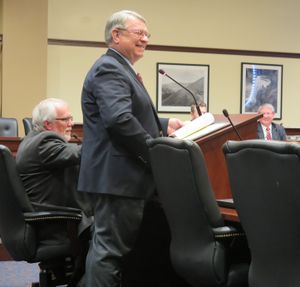Campaign finance reform bill introduced, over objections from Reps. Giddings, Scott
After an hour-long hearing and lots and lots of questions, the House State Affairs Committee this morning voted to introduce campaign finance reform legislation proposed by a legislative interim working group. Two committee members – Reps. Priscilla Giddings, R-White Bird, and Heather Scott, R-Blanchard – voted against introducing the bill, which requires more frequent and more detailed campaign finance reporting, extends reporting requirements to local elections, and requires entities doing independent campaign expenditures and out-of-state entities donating large sums to Idaho PACs or candidates to identify the source of the money.
The changes were unanimously recommended by a bipartisan interim working group that included both senators and representatives.
Many of the questions that State Affairs committee members asked Secretary of State Lawerence Denney and Chief Deputy Secretary of State Tim Hurst focused on things they saw in the bill that already are in current state law. Others focused on confusion over how often they, as candidates, would have to file reports; under the bill, reporting would be required monthly, where now it’s just at specific times of the year in election- or non-election years.
“It would certainly be nice if we could simply write the Sunshine Law to say what we really want to say: If you’re spending money to influence the outcome of elections, it needs to be reported,” Denney said after the hearing. “But the devil is in the details.”
He added, “What we’re trying to get at here is the dark money that comes in.”
Giddings told Denney she was “taken aback” by reading the terms “dark money” and “grey money” in the bill’s Statement of Purpose, “Because nowhere in these 29 pages have I seen those words. I almost feel like it’s implying something about our current elected officials and our current process.”
Denney responded, “There’s nothing specific in these bills that mention that. But dark money is that money that is coming in from outside that there’s no reporting.” Under the bill, he said, “If over $1,000 comes in from out of state, then you as a political candidate or committee cannot accept that unless that organization is registered in the state. It has no inference to candidates or elected officials. It’s just where that money is coming from.”
“Grey money is that money that’s transferred from PAC to PAC to PAC and you really have to know how to navigate to determine where that money came from,” he said, “and sometimes we get to the point where that grey money came from dark money to start with, and then it was transferred from several PACs. … It has nothing to do with how we feel about candidates. It’s where that money is coming from, and we would like to be able to identify the source.”
Scott asked, “So my mother-in-law sends me money from a different state. And if it’s a thousand dollars, she needs to report that also? Is that what you just said?”
Denney responded, “No. You have to report that. If it’s from out-of-state and it’s a thousand dollars or more from a PAC or an outside organization, they’d have to be registered with the state. But she would not have to report that. And of course you couldn’t accept more than a thousand dollars,” under current law.
Denney said after the hearing, “It is a large bill – I don’t think most of them understood the way it is drafted.” That includes several sections of current law being repealed and rewritten, he noted.
The committee’s vote today clears the way for a full hearing on the bill. As written, the changes in the bill wouldn’t take effect until July 1, 2019.
After the vote, committee Chairman Tom Loertscher, R-Iona, said, "You can see what a difficult deal this was during the work group in the interim. It wasn’t easy."

